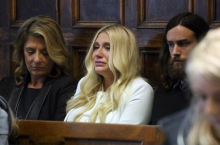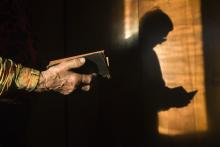sexual violence

As with many cases of rape and trauma, the truth of what happened to Kesha may take a long time to emerge. What is shocking and tragic here, in addition to the possibility that a trusted advisor and legal mentor could sexually assault his protégé (and then publicly deny it), is the very apparent commercial, and legal, incentive to keep the career and fortunes of woman in clear distress bound to her alleged abuser.

Rape. Domestic Violence. Acid Burnings. Female Infanticide. Human Trafficking. Emotional Abuse. Sexual Harassment. Genital Mutilation. These are just a few forms of sexual and gender-based violence (SGBV) that women and girls endure on a daily basis. But these assaults on the human spirit and sacred worth of women and girls will not have the last word.

Rape. Domestic Violence. Acid Burnings. Female Infanticide. Human Trafficking. Emotional Abuse. Sexual Harassment. Genital Mutilation. These are just a few forms of sexual and gender-based violence (SGBV) that women and girls endure on a daily basis. But these assaults on the human spirit and sacred worth of women and girls will not have the last word.

Rape. Domestic Violence. Acid Burnings. Female Infanticide. Human Trafficking. Emotional Abuse. Sexual Harassment. Genital Mutilation. These are just a few forms of sexual and gender-based violence (SGBV) that women and girls endure on a daily basis. But these assaults on the human spirit and sacred worth of women and girls will not have the last word.

Rape. Domestic Violence. Acid Burnings. Female Infanticide. Human Trafficking. Emotional Abuse. Sexual Harassment. Genital Mutilation. These are just a few forms of sexual and gender-based violence (SGBV) that women and girls endure on a daily basis. But these assaults on the human spirit and sacred worth of women and girls will not have the last word.

Rape. Domestic Violence. Acid Burnings. Female Infanticide. Human Trafficking. Emotional Abuse. Sexual Harassment. Genital Mutilation. These are just a few forms of sexual and gender-based violence (SGBV) that women and girls endure on a daily basis. But these assaults on the human spirit and sacred worth of women and girls will not have the last word.

Naming it “corrosive” and a “dark” sign of contemporary American culture, the U.S. Catholic bishops approved a document this week condemning the production and use of pornography as a mortal sin.
Reaction from the bishops’ critics didn’t take long. Some said the bishops themselves have very serious problems with pornography; others pointed out the not-so-distant sex abuse crisis. The upshot was that the bishops ought to have different priorities.
One could be forgiven for confusing this disagreement with one from the 1980s. Didn’t it play out over a generation ago — with the result that our culture basically accepts porn as part of sexual liberation?

For me, the question of what to do with Yoder is not only an academic issue but a personal one. I was Yoder’s graduate assistant — and would be his next-to-last — for two years. Academically, how I teach my “War and Peace in the Christian Tradition” course is indebted in great extent to what I learned from him. As evident in numerous footnotes, my scholarship and publications, including for Sojourners, over the last two decades on just war and just policing also owe a lot to both his research and his mentoring.
Nevertheless, after this semester, I am leaning towards Blanton’s recommendation of setting Yoder’s work aside, at least for the foreseeable future. I think it is now possible to rely on the work of others for persuasive defenses of nonviolence and for strong critiques of Niebuhrian realism. I struggled over whether to use one of his books or essays in my course this semester. I hesitated to say anything about Yoder’s misconduct to my students. It took me a while before I did so.
What to do with Yoder? I’m not sure.

Pope Francis began the final day of his U.S. visit by meeting privately with five adults abused as children by clergy, teachers, or family members, telling them they should expect the church to look after them and vowing “the zealous vigilance of the church to protect children and the promise of accountability for all,” including bishops.
“For those who were abused by a member of the clergy, I am deeply sorry for the times when you or your family spoke out, to report the abuse, but you were not heard or believed. Please know that the Holy Father hears and believes you,” he told the three women and two men — who he called “survivors” — at the private meeting at a seminary here on Sept. 27.
A leading victims’ advocacy group in the U.S. quickly dismissed the meeting as another “feel good, do nothing” papal meeting with survivors. This is the second time Francis has met with victims; the first was in the Vatican in July last year.
According to the Vatican’s account of the meeting, Francis expressed “deep regret” that some bishops shielded abusive priests, and added: “I pledge to you that we will follow the path of truth wherever it may lead. Clergy and bishops will be held accountable when they abuse or fail to protect children.”
The pope praised the witness of the victims, who were not identified, and said their presence was “so generously given despite the anger and pain you have experienced.”

Their presence reminds communities globally that sexual violence is not just a women’s issue. It is a human rights issue, and we need our sons to stand with young women as the next generation works to heal the whole community. Our sons understand the struggles of growing up on social media and witnessing the privacy of others exploited with a single click. They grew up in schools that prepare for mass shootings. They understand things differently than we do, and we need them to help lead us now that they are in college and entering the workforce.

Kranti is Hindi for "revolution." Indeed, this extraordinary organization is working to erase the heavy labels that come with being born, raised, and even trafficked in Kamathipura. Laal Batti Express ("Red Light Express") is a three-segment depiction of the girl’s delightful and dark stories, of which each performer was asked to add three.
"We call the girls revolutionaries," Robin said.

During my freshman year of college, a girl who lived in my dorm was raped. It was during the first month of school. I didn’t know her well. As the rumors spread, I remember thinking, “Oh yeah, the blonde with the big boobs.”
I remember having a conversation with my friend about how nice the accused boy seemed. I remember that friend replying, “She did wear low cut shirts during orientation — makes sense she would start a rumor like that.”
The survivor transferred from my college the following semester.
During my senior year of college, my best friend was the president of his fraternity. During the fall semester, there was a reported case of rape that occurred with two males and one female in the basement during a party. All I remember is how stressed my friend was because, as president, he had to deal with the legal proceedings of the case. The case was closed without either of the men being prosecuted. I remember being upset because my favorite fraternity was put on probation (no parties on the weekend) for two months. I never knew the survivor.
The documentary The Hunting Ground taught me I was part of campus rape culture, and I didn’t even realize it. It is estimated that between 20 percent and 25 percent of women experience completed or attempted rape over the course of a college career. That means for every 1,000 women attending a college or university, there are 35 incidents of rape each academic year.

I would never want anyone to experience what I endured and my hope is that everyone will join the fight to help end sexual assault.
If you ever find that you are a bystander, be bold and intervene for someone who is in danger of being sexually assaulted. Even when you are out with friends and familiar faces, do not let your guard down; unfortunately, 38% of rapists are a friend or acquaintance.
You may find yourself in a situation where you see something that is not quite right. Do not hesitate to step in. Ask questions if someone seems uncomfortable, and interrupt the situation. Show them that you care.Call for help if need be, but by all means, do not leave them alone. When you intervene, you help raise awareness and debunk myths about sexual assault.
If you know someone who has been sexually assaulted, listen to them and believe them. Your presence, boldness, and support can make all the difference.

WHEN I WAS 15, my church youth group was not a safe place. Like most youth groups, there were college-age volunteers who served as counselors and Bible study leaders.
One counselor, Paul, took it upon himself to constantly tell me I wore too much makeup, my clothes were too tight, and that I was a flirt. These actions took place in public for six months while other counselors and students watched and laughed. The interactions came to a head when he commented on my lipstick color and I snapped back at him. He grabbed me, forced me onto his lap, and told me I liked it.
At the time, I just thought Paul was creepy; I now recognize his behavior was sexual harassment. I also recognize that the other members of my youth group, including the leaders, saw his behavior and failed to intervene. Why did this happen? Both Paul’s behavior and the leaders’ silence belong to a larger set of attitudes in our culture—and churches—that allows sexual violence and sexual harassment to become normal, even expected, behaviors.
This set of attitudes is known as “rape culture.” When we fail to confront these toxic attitudes in our churches, we undermine our love for our neighbors, ignore the Bible, and misrepresent God as misogynistic.

The fact that the journalistic “scandal” got more public attention than the original story should give us pause. And the narrative that is playing out in the story’s wake — the one that says the college campus rape crisis is nothing more than a hoax perpetrated by the left — is disturbing.

WHEN IT COMES to speaking out on sexual violence, the first barrier for pastors is awareness of the problem, according to a LifeWay poll, “Broken Silence.” Commissioned by Sojourners and IMA World Health, the poll—released in June—surveyed Protestant pastors across the United States on their views on sexual and domestic violence. That church leaders don’t often discuss sexual violence is not surprising; for perhaps the first time in the United States, the poll puts numbers to just how few actually do—and illuminates some reasons for the silence.
The lack of awareness of sexual violence is a multipronged problem. According to the poll, 74 percent of surveyed pastors underestimate the level of sexual violence experienced by members of their congregations. In part, this gap reflects a failure to understand the tragic ubiquity of sexual violence—1-in-3 women in the United States, and 1-in-4 men, will experience intimate partner violence in their lifetime. In a country in which 80 percent affiliate with religion, statistics strongly indicate that this issue is as pervasive within congregations as without.
Another problem, however, is around the willingness to believe it is happening. Of the pastors who talk about sexual violence, 72 percent do so because they believe it happens in their local community—but only 25 percent acknowledged that their own congregants may have experienced it.
“It couldn’t happen among Christians” is, sadly, a very common refrain among faith institutions. Reported instances of sexual abuse this year at Christian colleges, from Patrick Henry to Pensacola, indicate the deep costs of this refusal to ask whether sexual violence could happen “within the flock.”

This week, the Baltimore Ravens terminated the contract of star runningback Ray Rice after video of Rice beating his then-fiancée Janay emerged online. Rice had previously been suspended for two games for the assault. With the release of the video, media scrutiny swiftly turned to his now-wife, speculating over why she would marry her abuser.
Beverly Gooden, a human resources manager and blogger, had a different response. Herself a survivor of domestic abuse, Gooden began tweeting of her own experiences, each one a vulnerable explanation: #WhyIStayed.
Gooden wrote, “I can't speak for Janay Rice, but I can speak for Beverly Gooden. Why did I stay? … Leaving was a process, not an event. And sometimes it takes awhile to navigate through the process. ...I hope those tweeting using #WhyIStayed find a voice, find love, find compassion, and find hope.”
We would all do well to listen. Some of the most powerful tweets below.

Religious leaders from across Africa and England came together Wednesday to discuss the role clergy should play in preventing and responding to sexual violence.
The panel was part of the three-day Global Summit to End Sexual Violence in Conflict co-chaired by Angelina Jolie, the special envoy for the U.N. high commissioner for refugees. Jolie made an unannounced appearance before the event, causing attendance to surge and preventing several dozen participants from entering the crowded conference room.
In a pre-recorded video message, Archbishop of Canterbury Justin Welby started the session by describing some of the positive developments he observed firsthand on a recent trip to the Democratic Republic of Congo.
“Historically there has been a culture of impunity,” he said. “Faith leaders are challenging that culture fiercely and saying that rape and sexual violence in war is absolutely unacceptable and will result in consequences.”
In his opinon column published on June 6, George Will suggests that colleges have "become the victims of progressivism," blaming a proliferation of victims on government overreach. In his first paragraph, Will disregards the validity of sexual assult on campuses, as he says:
[Colleges and universities] are learning that when they say campus victimizations are ubiquitous (“micro-aggressions,” often not discernible to the untutored eye, are everywhere), and that when they make victimhood a coveted status that confers privileges, victims proliferate. And academia’s progressivism has rendered it intellectually defenseless now that progressivism’s achievement, the regulatory state, has decided it is academia’s turn to be broken to government’s saddle.
In response to his article, survivors have taken to Twiter with #SurvivorPrivilege.
#SurvivorPrivilege pic.twitter.com/zNFggXGT64
— Elizabeth Plank (@feministabulous) June 9, 2014Today Vice President Joe Biden announced a series of new initiatives aimed at addressing sexual violence on college campuses and launched NotAlone.gov — a website that pools campus reporting data and points both students and school officials to sexual assault resources.
The administration is also releasing the first report of the White House Task Force to Protect Students from Sexual Assault, which was established in January.
Under Title IX, college campuses that receive federal funding are already required to take steps to prevent sexual assault on campus and respond promptly when sexual assault is reported. Further, the Clery Act requires those that receive funding to report their crime statistics and provide policies for prevention. The website NotAlone.gov will be a central repository for these reports and clarify for students their rights under the Clery Act and Title IX.
What is unclear, however, is what has changed for Christian college campuses and other private institutions.
Too many women and men are sexually assaulted in college. We must put an end to this violence. → http://t.co/9QH89qCLvd #1is2Many
— Office of VP Biden (@VP) April 29, 2014